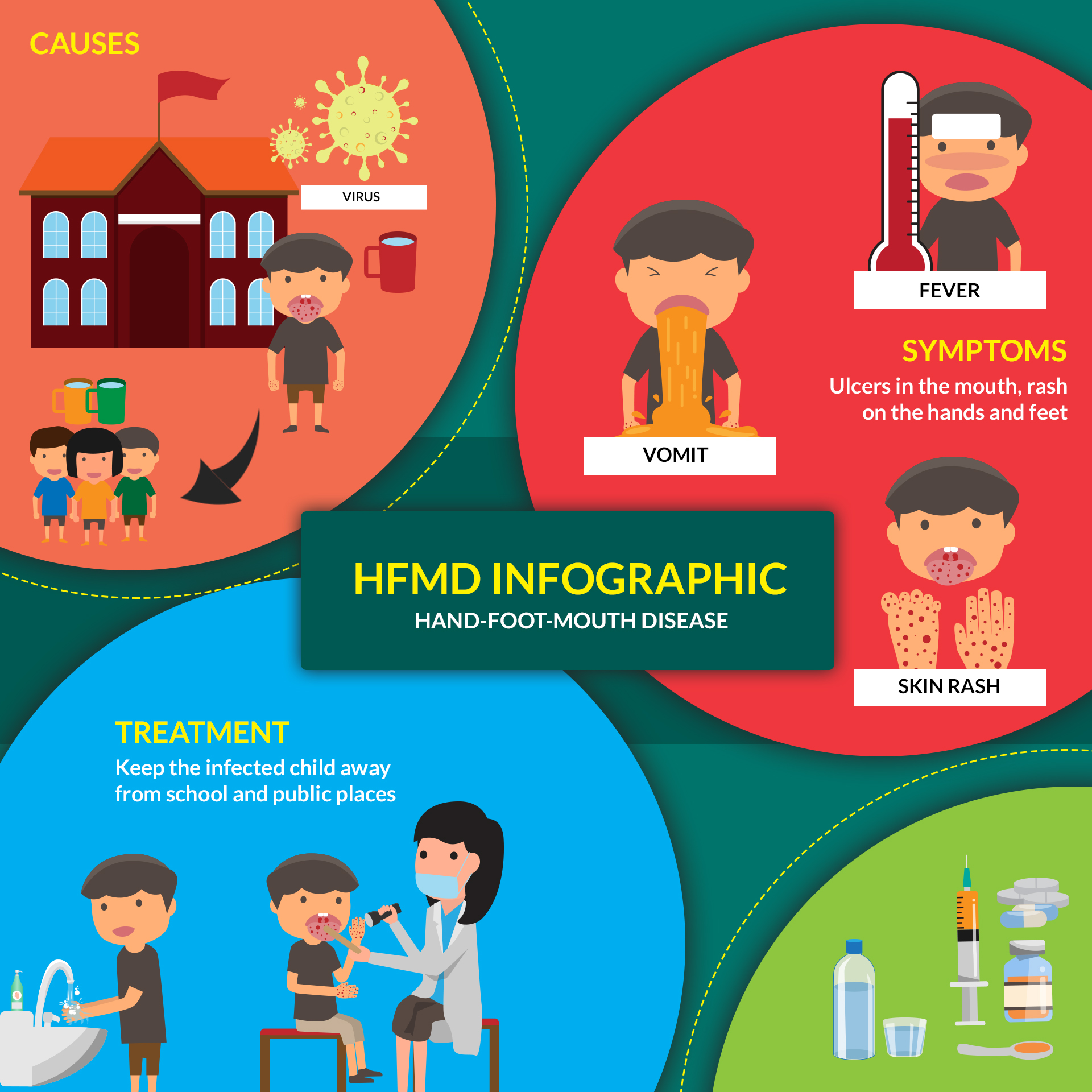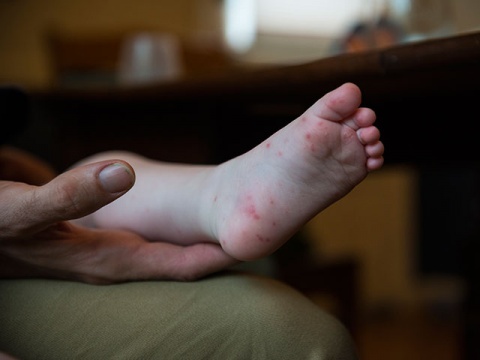Hand Foot Mouth Disease (HFMD) Advice from a Paediatrician
What Is HFMD?
Hand Foot Mouth Disease (HFMD) is a highly contagious viral infection which is common in young children and is characterized by ulcers in the mouth and a rash on the hands and feet. It is caused by a family of viruses called Enteroviruses, the commonest being the Coxsackie virus and Enterovirus. These viruses spread through direct person-to-person contact, nasal discharge, saliva, faeces, and fluids from the rash of an infected person.
Dr Tan Zhen Han, a Paediatrician from SBCC Baby and Child Clinic (Bukit Panjang Plaza), a member of Heathway Medical Group, shares what you as parents should know about Hand-Foot-Mouth-Disease (HFMD).
HFMD mainly affects children below age 10 and especially those under 5. Children at these ages are more susceptible because they may not have developed the immunity to the viruses that cause HFMD, as well as they have the tendency to put their hands in their mouths. Caregivers including yourselves who are in close contact with a sick child are also at risk of getting infected.
What Are The HFMD Symptoms?
Dr Tan says, “With the prevalence of HFMD, it is advisable for you, caregivers, and teachers to be watchful and examine your children and students daily for the following symptoms.”
- Fever
- Sore throat
- Ulcers in the throat, tongue, and mouth
- Rashes or small blisters on the palms of the hands, soles and buttocks. They can also appear around the mouth, elbows, knees and genital area.
- Poor appetite
- Vomiting and or diarrhoea
The HFMD symptoms may vary among children and may appear at different stages of the illness. The incubation period, which refers to the period between exposure to the virus and the appearance of the first symptoms, is usually 3-5 days, with a range of 2 days to 2 weeks.
What Are The Potential Complications of HFMD
HFMD usually results in mild symptoms in children. However, poor oral fluid intake due to the pain from the ulcers in the mouth may lead to dehydration. Scratching at the rashes also poses a risk of secondary skin infection.
Complications affecting the brain, lung or heart are rare but can occur, especially where the infection is caused by a more severe virus strain (e.g. Enterovirus 71).
What to Do if Your Child Gets HFMD?
You should consult a doctor as soon as your child has HFMD symptoms. Whilst there is no specific treatment for HFMD, your child can be given symptomatic treatment to manage the fever and painful mouth ulcers.
Examples of symptomatic treatment include:
- Putting your child on a soft diet like porridge, oatmeal, fruit purees, yoghurt to reduce the pain when swallowing.
- Giving your child plenty of fluids such as cold milk, diluted juices, rice or barley water to prevent dehydration.
- Giving your child popsicles for temporary relief from painful blisters in the mouth area.
- Avoid salty or spicy foods and citrus foods as they may make the oral pain worse.
It is very important for you to inform your child’s school or childcare centre immediately and keep the sick child away from public places.
You should also exercise good hygiene discipline to protect your family and to prevent the virus from spreading. (Please read the suggestions under prevention)
How Do I Know if My Child Has Fully Recovered?
Children with HFMD usually recover within a week. They should be isolated and excluded from school, childcare facilities, and public areas until their oral ulcers are gone, rash or skin blisters have dried up or cleared up, and any fever has settled. They would require a medical clearance letter from your doctor before returning to school.
When to Seek Immediate Medical Attention?
Dr Tan advises to seek immediate medical attention if your child complains or shows the following symptoms:
- Poor oral intake of fluids
- Signs of dehydration such as decreased urine, dry lips and or tongue and no tears when crying
- Abnormal behaviour such as appearing lethargic, drowsy or irritable, or crying persistently
- Sudden headache, neck stiffness or pain
- Difficulty breathing
- Occurrence of a fit (seizure)
How to Prevent My Child from HFMD?
There are neither any effective anti-viral medications nor vaccines currently available (only China has vaccines against one specific virus strain). The best strategy to manage HFMD remains that of prompt diagnosis, treatment, isolation of cases, as well as the prevention of HFMD transmission.
You can help to prevent HFMD from spreading by monitoring your children daily for any fever, rash or ulcers, and teaching them good hygiene habits such as:
- Washing their hands with soap thoroughly and frequently, especially before eating and after using the toilet.
- Covering their mouth and nose with tissue paper when coughing or sneezing.
- Wearing a face mask when feeling unwell.
- Avoid sharing food, drinks, utensils, toothbrushes or towels with others.
- Avoid putting toys or other shared items into their mouth.
You can be a good role model for your children by following these practices strictly.
In addition, you can prevent HFMD by being diligent in cleaning and disinfecting common areas, toys and appliances thoroughly.
Dr Tan stresses that “Parents, teachers and caregivers play a crucial role in detecting infections, containing the spread and even prevention. Let us start being vigilant and look out for our children.”
With HFMD on the rise in Singapore, are you actively taking prevention measures? Feel free to share your thoughts in the comments below!
 Dr Tan Zhen Han is a Paediatrician from SBCC Baby and Child Clinic (Bukit Panjang Plaza), a member of Healthway Medical Group.
Dr Tan Zhen Han is a Paediatrician from SBCC Baby and Child Clinic (Bukit Panjang Plaza), a member of Healthway Medical Group.
Dr Tan Zhen Han graduated on the Dean’s List from the Yong Loo Lin School of Medicine, National University of Singapore with a Bachelor of Medicine and Bachelor of Surgery degree in 2008. He trained in Paediatric Medicine, Neonatology, Intensive Care, and Children’s Emergency and other departments during his seven-year tenure at KK Women’s and Children’s Hospital and Singapore General Hospital.
Dr Tan is an established Paediatrician, having published several papers in international peer-reviewed scientific journals. He has also received various awards such as the Outstanding House Officer Award in the Department of Paediatrics in 2008 and the Singapore Health Quality Service Award (Silver Award) in 2012.
More about Dr Tan Zhen Han
Dr Tan Zhen Han graduated on the Dean’s List from the Yong Loo Lin School of Medicine, National University of Singapore with a Bachelor of Medicine and Bachelor of Surgery degree in 2008. He trained in Paediatric Medicine, Neonatology, Intensive Care, and Children’s Emergency and other departments during his seven-year tenure at KK Women’s and Children’s Hospital and Singapore General Hospital.
Dr Tan is an established Paediatrician, has published several papers in international peer-reviewed scientific journals. He has also received various awards such as the Outstanding House Officer Award in the Department of Paediatrics in 2008 and the Singapore Health Quality Service Award (Silver Award) in 2012.









Give your Opinions